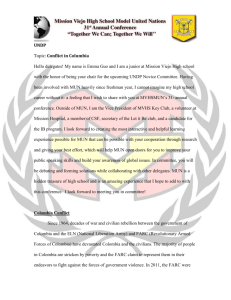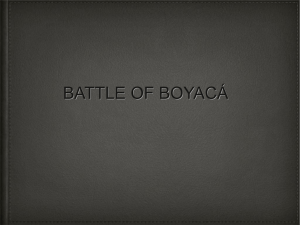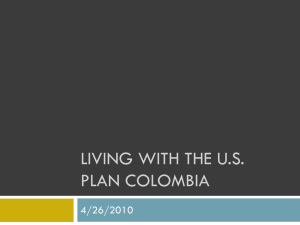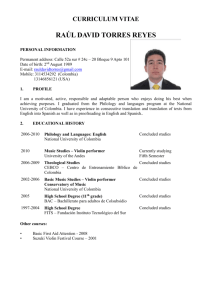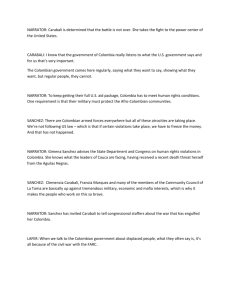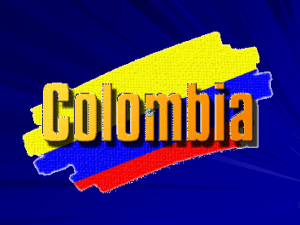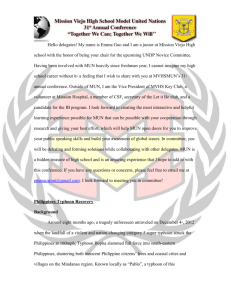The Republic of Colombia
advertisement
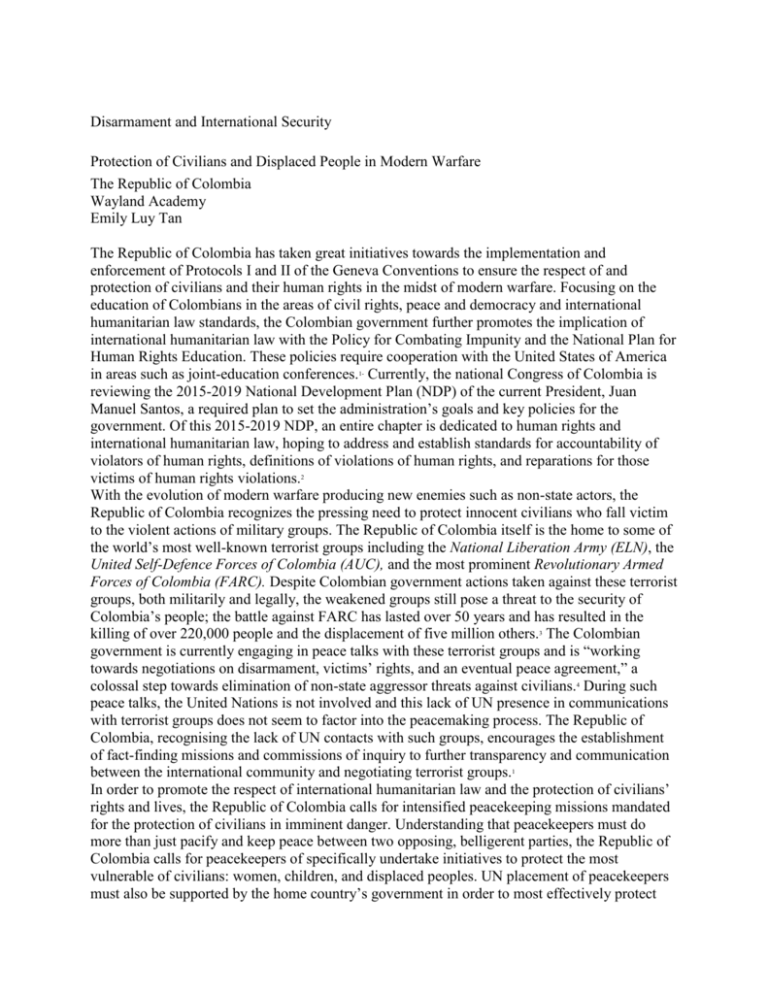
Disarmament and International Security Protection of Civilians and Displaced People in Modern Warfare The Republic of Colombia Wayland Academy Emily Luy Tan The Republic of Colombia has taken great initiatives towards the implementation and enforcement of Protocols I and II of the Geneva Conventions to ensure the respect of and protection of civilians and their human rights in the midst of modern warfare. Focusing on the education of Colombians in the areas of civil rights, peace and democracy and international humanitarian law standards, the Colombian government further promotes the implication of international humanitarian law with the Policy for Combating Impunity and the National Plan for Human Rights Education. These policies require cooperation with the United States of America in areas such as joint-education conferences.1- Currently, the national Congress of Colombia is reviewing the 2015-2019 National Development Plan (NDP) of the current President, Juan Manuel Santos, a required plan to set the administration’s goals and key policies for the government. Of this 2015-2019 NDP, an entire chapter is dedicated to human rights and international humanitarian law, hoping to address and establish standards for accountability of violators of human rights, definitions of violations of human rights, and reparations for those victims of human rights violations.2 With the evolution of modern warfare producing new enemies such as non-state actors, the Republic of Colombia recognizes the pressing need to protect innocent civilians who fall victim to the violent actions of military groups. The Republic of Colombia itself is the home to some of the world’s most well-known terrorist groups including the National Liberation Army (ELN), the United Self-Defence Forces of Colombia (AUC), and the most prominent Revolutionary Armed Forces of Colombia (FARC). Despite Colombian government actions taken against these terrorist groups, both militarily and legally, the weakened groups still pose a threat to the security of Colombia’s people; the battle against FARC has lasted over 50 years and has resulted in the killing of over 220,000 people and the displacement of five million others.3 The Colombian government is currently engaging in peace talks with these terrorist groups and is “working towards negotiations on disarmament, victims’ rights, and an eventual peace agreement,” a colossal step towards elimination of non-state aggressor threats against civilians.4 During such peace talks, the United Nations is not involved and this lack of UN presence in communications with terrorist groups does not seem to factor into the peacemaking process. The Republic of Colombia, recognising the lack of UN contacts with such groups, encourages the establishment of fact-finding missions and commissions of inquiry to further transparency and communication between the international community and negotiating terrorist groups.1 In order to promote the respect of international humanitarian law and the protection of civilians’ rights and lives, the Republic of Colombia calls for intensified peacekeeping missions mandated for the protection of civilians in imminent danger. Understanding that peacekeepers must do more than just pacify and keep peace between two opposing, belligerent parties, the Republic of Colombia calls for peacekeepers of specifically undertake initiatives to protect the most vulnerable of civilians: women, children, and displaced peoples. UN placement of peacekeepers must also be supported by the home country’s government in order to most effectively protect the rights and lives of innocent civilians while protecting the sovereignty of individual states. In accordance to the statement made by the Colombian delegate to the 6917th meeting of the Security Council, Osorio Londoño, the Republic of Colombia further emphasises that “the promotion of peace processes and respect for human rights and rule of law was of utmost importance in protecting civilians.”5 1 Report of the Secretary General. Status of the Protocol Additional to the Geneva Conventions of 1949 and Relating to the Protection of Victims of Armed Conflicts. Rep. N.p.: United Nations General Assembly, 2012. Print. 2 "National Development Plan 2010-2014 (Colombia) "Prosperity for All"" National Development Plan 2010-2014 (Colombia) "Prosperity for All" The REDD Desk, 2010. Web. 3 "Profiles: Colombia's Armed Groups." BBC News: Latin America and Caribbean. BBC News, 29 Aug. 2014. Web. 4 "Colombia's Farc Admits Conflict 'impact' on Civilians." BBC News. BBC News, 30 Oct. 2014. Web. 5 United Nations. Security Council. Security Council Says States Have Primary Responsibility for Protecting Civilians in Conflict, Reaffirms Peacekeeping Missions Need Protection Mandate, Resources. United Nations. United Nations, 12 Feb. 2013. Web.
